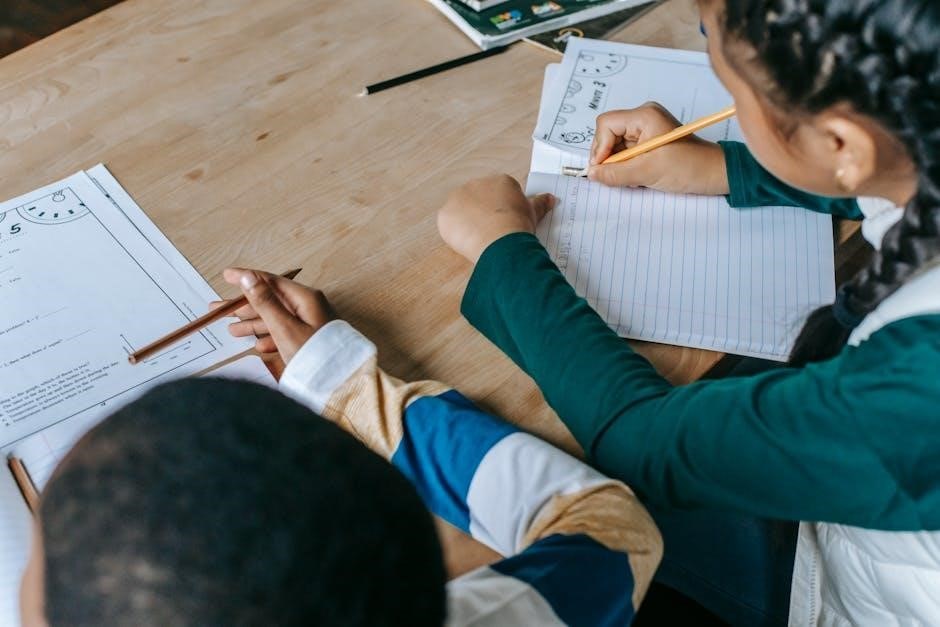Social-Emotional Learning (SEL) worksheets in PDF format provide structured tools for fostering emotional growth, self-awareness, and social skills in students of all ages; They offer accessible, printable resources.
Overview of Social-Emotional Learning (SEL)
Social-Emotional Learning (SEL) focuses on developing essential life skills, including self-awareness, emotional regulation, social skills, relationship management, and responsible decision-making. These competencies help individuals understand and manage their emotions, empathize with others, and build positive relationships. SEL is integral for personal and academic success, fostering resilience, teamwork, and problem-solving abilities. By integrating SEL into education, educators empower students to navigate challenges, achieve their goals, and contribute positively to their communities. Effective SEL practices create a supportive environment where students can thrive emotionally, socially, and academically. The internet highlights various tools, such as worksheets and activities, designed to make SEL accessible and engaging for learners of all ages. These resources emphasize the importance of fostering emotional intelligence and social awareness in a structured and meaningful way.
Importance of Worksheets in SEL Development
Worksheets play a crucial role in Social-Emotional Learning (SEL) development by providing structured activities that foster self-awareness, emotional regulation, and social skills. They offer a tangible way for students to engage with SEL concepts, making abstract ideas more concrete. Worksheets are adaptable to various age groups and learning styles, ensuring inclusivity and accessibility. They also serve as valuable tools for teachers to assess students’ understanding and progress in SEL. By incorporating exercises like identifying emotions, role-playing scenarios, and reflection prompts, worksheets help students develop essential life skills. Their portability and ease of use make them ideal for both classroom and remote learning environments, ensuring consistent SEL practice. Additionally, worksheets provide a sense of accomplishment as students complete tasks, boosting confidence and motivation in their emotional and social growth.
Benefits of Using PDF Formats for SEL Materials
The use of PDF formats for SEL materials offers numerous advantages, making them a preferred choice for educators and learners. PDFs are universally accessible, ensuring compatibility across all devices and operating systems. They maintain consistent formatting, preserving the integrity of worksheets and activities. PDFs are easily printable, allowing for physical use in classrooms or at home. Additionally, they can be shared effortlessly via email or online platforms, facilitating distribution. Many PDFs are editable, enabling users to type directly into worksheets, enhancing convenience. Their versatility supports interactive elements like fillable fields and checkboxes, making SEL activities more engaging. PDFs are also cost-effective and environmentally friendly, reducing the need for physical materials. Overall, PDFs provide a practical and flexible solution for delivering high-quality SEL resources, catering to diverse learning needs and preferences.
Key Components of Effective SEL Worksheets
Effective SEL worksheets integrate self-awareness exercises, emotional regulation activities, and social skills development, ensuring comprehensive growth while catering to diverse learning needs and preferences.
Self-Awareness Exercises

Self-awareness exercises are foundational in SEL worksheets, helping students identify and understand their emotions, values, and strengths. These activities often include emotion identification, self-reflection prompts, and goal-setting templates. By fostering introspection, students gain clarity about their thoughts and feelings, enabling better decision-making. Worksheets may feature mood charts, journals, or checklists to track emotional states and personal growth. Such exercises empower students to recognize patterns in their behavior and develop a positive self-image. Cultivating self-awareness early on equips students with the tools to navigate life’s challenges confidently and mindfully, laying a strong foundation for overall emotional intelligence and well-being. These exercises are often tailored to different age groups, ensuring relevance and effectiveness in various educational settings.

Emotional Regulation Activities
Emotional regulation activities in SEL worksheets help students manage and modulate their emotional responses. These exercises include deep breathing techniques, mood charts, and reflective journaling to identify triggers. Worksheets often feature scenario-based tasks where students practice calming strategies, such as counting or visualization. Role-playing activities allow students to simulate stressful situations and apply regulation skills. These tools assist in developing self-control and resilience, enabling students to handle emotional challenges effectively. By incorporating these practices, students learn to recognize and manage their emotions, fostering a positive and stable emotional environment. Emotional regulation activities are tailored to different age groups, ensuring they meet the developmental needs of students. These exercises are crucial for building emotional intelligence and promoting long-term well-being.
Social Skills Development
Social skills development is a critical component of SEL worksheets, focusing on fostering positive interactions and effective communication. Activities include role-playing scenarios, group collaboration tasks, and exercises that promote empathy and active listening. Worksheets often feature conversation starters, conflict resolution strategies, and cooperation-building games. These tools help students develop essential skills such as initiating and maintaining conversations, understanding social cues, and resolving disagreements; By engaging in these activities, students learn to navigate social dynamics confidently and build strong, respectful relationships. Social skills development worksheets are designed to be interactive and inclusive, ensuring that all students can participate and grow. They provide a structured yet flexible approach to teaching vital life skills that extend beyond the classroom.

How to Choose the Right SEL Worksheets
Selecting effective SEL worksheets involves aligning with curriculum goals, ensuring age appropriateness, and incorporating cultural responsiveness to meet diverse student needs and promote engagement.
Aligning with Curriculum Goals
SEL worksheets should complement existing curriculum objectives, ensuring seamless integration with academic lessons. By aligning activities with classroom goals, educators can reinforce social-emotional skills like self-reflection and empathy while maintaining focus on core subjects. For instance, worksheets that incorporate self-awareness exercises can support students in understanding their learning styles, fostering better academic performance. Additionally, group collaboration tasks can mirror teamwork dynamics in other subjects, promoting consistency in skill development. Ensuring that SEL materials align with curriculum goals helps create a cohesive learning environment, where social-emotional growth is not an add-on but an integral part of daily education. This approach maximizes the effectiveness of SEL worksheets, making them a valuable resource for holistic student development.
Considering the Target Age Group

SEL worksheets must be tailored to the developmental stage of the students, ensuring they are age-appropriate and engaging. For younger students, activities focus on basic emotional recognition and social interactions, while older students benefit from more complex exercises like role-playing or reflective journaling. Worksheets designed for preschoolers often include visual aids and simple language to help them identify emotions, while those for middle school students might address peer relationships and self-management. High school students may engage in advanced activities that promote self-awareness and decision-making skills. By aligning the content with the maturity level of the students, educators can ensure that SEL worksheets are both effective and relevant, fostering growth in social-emotional skills at every stage of development.
Incorporating Cultural Responsiveness

Culturally responsive SEL worksheets ensure that diverse student backgrounds are acknowledged and respected. They include scenarios and examples that reflect various cultural experiences, helping students connect emotionally and intellectually. Activities should avoid stereotypes and incorporate inclusive language, fostering empathy and understanding among all learners. Worksheets might feature stories or images that represent different cultures, encouraging students to explore their own identities and those of others. By integrating diverse perspectives, educators promote an inclusive classroom environment where every student feels valued and heard. This approach not only enhances social-emotional learning but also supports academic success by creating a sense of belonging and respect for all students, regardless of their cultural background or identity.

Interactive Activities for Engagement
Engage students with group collaboration tasks, reflective journaling prompts, and role-playing scenarios. These activities foster teamwork, self-expression, and hands-on learning, enhancing social-emotional development in meaningful ways.
Group Collaboration Tasks
Group collaboration tasks are essential for fostering teamwork and communication skills among students. These activities encourage shared problem-solving, mutual respect, and empathy. By working together on structured exercises, students learn to value diverse perspectives and build stronger interpersonal connections. Collaborative tasks often involve brainstorming sessions, shared goal-setting, or completing projects that require input from all group members. Such activities not only enhance social skills but also promote a sense of responsibility and accountability. Worksheets designed for group work can include team-based puzzles, role-playing scenarios, or reflective discussions. These tasks help students navigate social dynamics, resolve conflicts, and develop leadership qualities. When integrated into SEL programs, group collaboration tasks create a supportive environment where students can grow emotionally and socially together. They are a powerful tool for preparing students to thrive in collaborative real-world settings.
Reflective Journaling Prompts
Reflective journaling prompts are a powerful tool for fostering self-awareness and emotional processing in students. These prompts, often included in SEL worksheets, encourage students to explore their thoughts, feelings, and experiences in a structured yet personal manner. By guiding students to reflect on specific topics, such as challenges they’ve faced, successes they’ve achieved, or emotions they’ve experienced, these prompts help develop introspection and self-understanding. Many prompts are open-ended, allowing students to express themselves freely and deeply. Reflective journaling also provides a safe space for students to document their growth over time, gaining insights into their personal development. This practice not only enhances emotional intelligence but also strengthens writing and communication skills. Incorporating reflective journaling into SEL programs empowers students to connect with their inner selves and navigate life’s complexities with greater clarity and confidence.
Role-Playing Scenarios
Role-playing scenarios are interactive activities that allow students to practice social skills, empathy, and problem-solving in a safe and guided environment. These exercises, often included in SEL worksheets, provide students with the opportunity to act out real-life situations, such as resolving conflicts, expressing emotions, or collaborating with peers. By assuming different roles, students gain insight into diverse perspectives and develop a deeper understanding of social dynamics. Many worksheets offer pre-designed scenarios that educators can tailor to specific learning objectives. Role-playing also encourages active participation, helping students build confidence and emotional intelligence. This hands-on approach not only enhances interpersonal skills but also fosters a sense of responsibility and cooperation among learners. Through these engaging activities, students can navigate complex social situations with greater ease and awareness.

